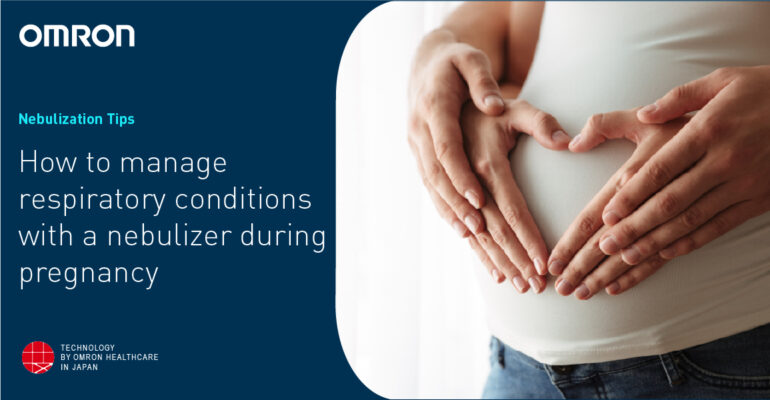How to manage respiratory conditions with a nebulizer during pregnancy
February 20, 2023 2023-10-05 10:36How to manage respiratory conditions with a nebulizer during pregnancy

How to manage respiratory conditions with a nebulizer during pregnancy
Pregnancy is a beautiful time for women, but it may also be difficult for those who suffer from respiratory disorders such as asthma, chronic obstructive pulmonary disease (COPD), and bronchitis. These conditions can cause shortness of breath, coughing, wheezing, and other symptoms that can make it difficult for pregnant women to breathe and affect the health of both the mother and the baby. In this blog we will go through how to use a nebulizer to treat respiratory issues during pregnancy.
Is It Safe to Use a Nebulizer While Pregnant?
According to research, the rate of asthma worsening during pregnancy is 18.8%, which is lower than previously reported figures. Using a nebulizer to manage respiratory conditions during pregnancy is considered safe for most women. Nebulizers function by delivering a thin mist of medication straight to the lungs, allowing the medication to have an immediate effect. [1]
Pregnant women who have a cough, congestion, or shortness of breath may find a nebulizer useful in controlling their symptoms. However, it is important to talk to your healthcare provider about the risks and benefits of using a nebulizer to manage respiratory conditions during pregnancy. Some medications used in nebulizers may not be safe for use during pregnancy, while others are considered safe. Your healthcare practitioner can give important information about the safety and effectiveness of nebulizer usage during pregnancy, as well as assist you in selecting the appropriate medicine and dose for your requirements. It is critical to use nebulizers correctly and to take other precautions to decrease the risk of adverse side effects and to guarantee the health of both the mother and the infant. [2]
Using a nebulizer during pregnancy:
-
Proper nebulizer use:
To avoid infections or other issues, pregnant women should follow the cleaning recommendations for the nebulizer after each usage. This entails disassembling the nebulizer and thoroughly cleaning all of its components using soap and water. The nebulizer should be air-dried before storing it. Proper maintenance and cleaning of the nebulizer can reduce the risk of bacterial or fungal infections that could harm the mother and the developing fetus. [3]
-
Precautions during nebulizer use:
Pregnant women should use a mask and utilize the nebulizer in a well-ventilated room when using a nebulizer to limit the risk of exposure to hazardous compounds in the surroundings / environment. They should also avoid sharing their nebulizer with others to prevent the spread of infections.
-
Alternative treatments:
In some cases, alternative treatments may be recommended for pregnant women with respiratory conditions, such as inhalers or oral medications. These treatments may be preferred if they are considered safer for the mother and the developing fetus. However, nebulizers can be more effective for delivering medication directly to the lungs and may be necessary for certain respiratory conditions. [4]
Benefits of using a nebulizer during pregnancy:
- Effective treatment: Nebulizers can be more effective for delivering medication directly to the lungs, which can help to manage respiratory symptoms and prevent complications that could harm the mother and the developing fetus.
- Rapid relief: Nebulizers can provide rapid relief from respiratory symptoms, such as shortness of breath, wheezing, and coughing, which can improve the quality of life for pregnant women.
- Targeted treatment: Nebulizers can deliver targeted treatment to the lungs, which can reduce the amount of medication needed and minimize the risk of side effects from oral medications.
- Reduced risk of systemic effects: Nebulizers can lower the likelihood of systemic side effects from medicine, such as changes in blood pressure or heart rate, which is especially relevant for pregnant women.[5]
Risk of using a nebulizer during pregnancy:
- Exposure to harmful substances: Using a nebulizer can expose pregnant women to harmful substances in the medication or environment, which can pose a risk to the mother and the developing fetus.[6]
- Risk of infection: Nebulizers can increase the risk of respiratory infections, particularly if they are not cleaned properly or if they are shared with others.[7]
- Adverse effects on fetal development: Some drugs used in nebulizers can harm fetal development, especially if administered in high doses or for lengthy periods of time.
- Risk of preterm labor: In rare cases, the use of nebulizers could trigger preterm labor, particularly if the medication used causes bronchodilation, which could stimulate contractions.
The healthcare provider can provide information about the benefits and risks of nebulizers, inhalers, and oral medications for pregnant women with respiratory conditions. They can help choose the best option based on the severity of the condition, the risks and benefits of each treatment, and the individual needs of the mother and the developing fetus.
The Omron nebulizer is a popular choice for pregnant women with respiratory conditions. It is designed to deliver medication effectively and efficiently to the lungs. The nebulizer is compact and quiet, making it easy to use and transport. It also has adjustable airflow and medication dosage settings, allowing for customized treatment. The Omron nebulizer is easy to clean and maintain, reducing the risk of infections or other complications.
Wrap-Up
Managing respiratory conditions during pregnancy can be challenging, but it is possible with proper management and treatment. Pregnant women can effectively manage respiratory diseases and ensure the health of both the mother and the baby by using a nebulizer correctly, selecting the right drug, monitoring symptoms, and taking other precautions.
Reference:
- https://www.ncbi.nlm.nih.gov/pmc/articles/PMC7060439/
- https://www.ncbi.nlm.nih.gov/pmc/articles/PMC7104998/
- https://www.wizardresearch.com/blogs/news/is-it-safe-to-use-a-nebulizer-during-pregnancy-tips-for-continuing-therapy
- https://www.ncbi.nlm.nih.gov/pmc/articles/PMC7104998/
- https://cuddl.com/pregnancy/is-it-safe-to-use-a-saline-nebulizer-during-pregnancy-asthma-albuterol-and-pregnancy/
- Is It Safe To Use A Nebulizer While Pregnant? | TruNeb™ Nebulizer
- https://www.ncbi.nlm.nih.gov/pmc/articles/PMC7124163/






